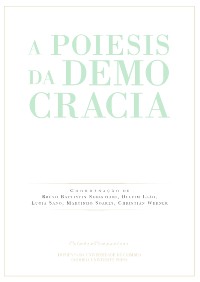Please use this identifier to cite or link to this item:
https://hdl.handle.net/10316.2/45161| DC Field | Value | Language |
|---|---|---|
| dc.contributor.author | Silva, Maria de Fátima | |
| dc.date.accessioned | 2019-01-21T11:05:36Z | |
| dc.date.accessioned | 2020-09-04T22:08:31Z | - |
| dc.date.available | 2019-01-21T11:05:36Z | |
| dc.date.available | 2020-09-04T22:08:31Z | - |
| dc.date.issued | 2018 | - |
| dc.identifier.isbn | 978-989-26-1678-0 | |
| dc.identifier.isbn | 978-989-26-1679-7 (PDF) | |
| dc.identifier.uri | https://hdl.handle.net/10316.2/45161 | - |
| dc.description.abstract | Frogs is essentially a reflection about dramatic art in its formal diversity and the role played by gods and poets alike in relation to citizens. As a political art, poetry has two priorities that at first sight appear harmonious, but reveal themselves as competitive: skill and advice. Therefore the difference between past and modern poets - Aeschylus and Euripides as their paradigms in a strong agon - signifies the evaluation that each one makes of 'social usefulness' and 'technical skill'. Being dexiotes, at the end of the 5th century, the great criterium of quality, it is felt necessary to recuperate the greater aim of theatre, that is, nouthesia. | eng |
| dc.description.abstract | Rãs é, no essencial, uma ref lexão sobre a arte dramática na sua diversidade de formas e sobre a missão que a todos, deus e poetas, toca desempenhar junto dos cidadãos. Como arte política, evocam-se duas prioridades da poesia que, de harmónicas, se foram tornando competitivas, "o talento" e "o conselho". Ou seja, a diferença que parece opor os poetas do passado aos da nova vaga - Ésquilo e Eurípides como seus paradigmas em vigoroso agon - é a valorização relativa que fazem da 'utilidade social' e da 'mestria técnica'. Num universo onde a dexiotes se impôs como o grande fator de qualidade, é preciso recuperar esse outro objetivo maior, a nouthesia, a ética ao serviço da qual a versatilidade estética deve estar. | por |
| dc.language.iso | por | - |
| dc.publisher | Imprensa da Universidade de Coimbra | por |
| dc.relation.ispartof | http://hdl.handle.net/10316.2/45144 | por |
| dc.rights | open access | - |
| dc.subject | comedy | eng |
| dc.subject | tragedy | eng |
| dc.subject | literary criticism | eng |
| dc.subject | public service | eng |
| dc.subject | Dionysus | eng |
| dc.subject | comédia | por |
| dc.subject | tragédia | por |
| dc.subject | teoria literária | por |
| dc.subject | serviço público | por |
| dc.subject | Dioniso | por |
| dc.title | 'Talento e conselho': O contributo do poeta na cidade | por |
| dc.title.alternative | Skill and advice' : the contribution of the poet in the city | eng |
| dc.type | bookPart | por |
| uc.publication.firstPage | 383 | - |
| uc.publication.lastPage | 409 | - |
| uc.publication.location | Coimbra | por |
| dc.identifier.doi | 10.14195/978-989-26-1679-7_14 | - |
| uc.publication.digCollection | PB | por |
| uc.publication.orderno | 14 | - |
| uc.publication.area | Artes e Humanidades | por |
| uc.publication.bookTitle | A poiesis da democracia | - |
| uc.publication.manifest | https://dl.uc.pt/json/iiif/10316.2/45161/200645/manifest?manifest=/json/iiif/10316.2/45161/200645/manifest | - |
| uc.publication.thumbnail | https://dl.uc.pt/retrieve/11011888 | - |
| uc.publication.parentItemId | 55084 | - |
| uc.itemId | 68133 | - |
| item.grantfulltext | open | - |
| item.fulltext | With Fulltext | - |
| Appears in Collections: | A poiesis da democracia | |
Files in This Item:
| File | Description | Size | Format | |
|---|---|---|---|---|
| talento_e_conselho.pdf | 3.34 MB | Adobe PDF |  |
Items in DSpace are protected by copyright, with all rights reserved, unless otherwise indicated.
